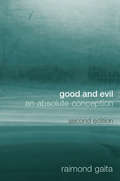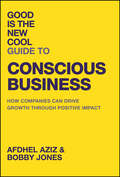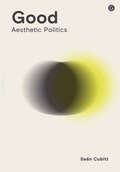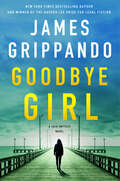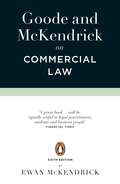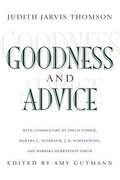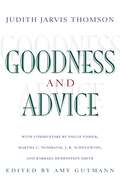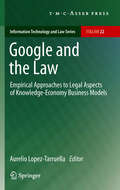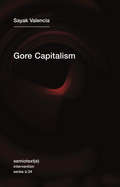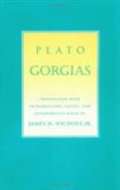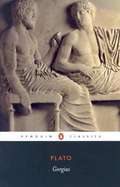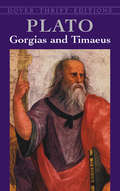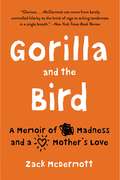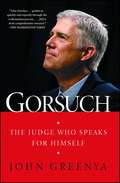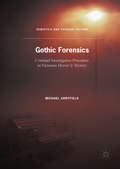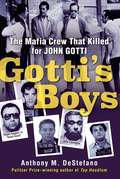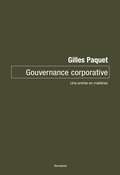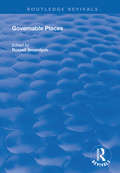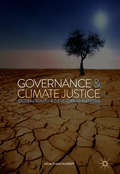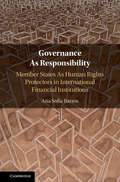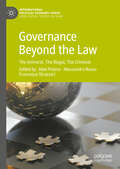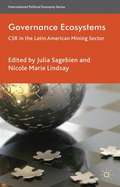- Table View
- List View
Good and Evil: An Absolute Conception
by Raimond GaitaRaimond Gaita's Good and Evil is one of the most important, original and provocative books on the nature of morality to have been published in recent years. It is essential reading for anyone interested in what it means to talk about good and evil. Gaita argues that questions about morality are inseparable from the preciousness of each human being, an issue we can only address if we place the idea of remorse at the centre of moral life. Drawing on an astonishing range of thinkers and writers, including Plato, Wittgenstein, George Orwell and Primo Levi, Gaita also reflects on the place of reason and truth in morality and ultimately how questions about good and evil are connected to the meaning of our lives.This revised edition of Good and Evil includes a substantial new preface and afterword by the author.
Good is the New Cool Guide to Conscious Business: How Companies Can Drive Growth Through Positive Impact
by Bobby Jones Afdhel AzizHow brands can evolve to win with conscious consumers In the Good is the New Cool Guide to Conscious Business: How Companies Can Drive Growth Through Positive Impact, conscious capitalism experts Afdhel Aziz and Bobby Jones deliver all of the knowledge and tools needed to discover, design, and deploy sustainable and inclusive growth within any organization. This book draws on stories, insights, and case studies from leaders at successful purpose-driven corporations around the world, from Fortune 500 giants like Unilever and Procter to tech disruptors like Tesla, Microsoft, and Airbnb, as well as beloved brands like Lego, Adidas, and Patagonia. In the last decade, corporations were required to meet the digital age's challenges and opportunities. Today, corporations must meet the purpose-based demands of consumers, employees, and investors—or get left behind. In this book, readers will learn about: The seven qualities of an inspiring and motivating purpose statement Harnessing nine principles of purpose, including “Purpose doesn't have to be political,” “Purpose is about putting your money where your mission is,” and “Purpose is about measuring what you treasure” Understanding the rise of impact investors and measuring the ROI of purpose-based corporate initiatives Thought-provoking, accessible, and inspiring, the Good Is the New Cool Guide to Conscious Business earns a well-deserved spot on the bookshelves of all C-suite business leaders seeking a new vision to transform their organizations, and the world, for the better.
Good: Aesthetic Politics
by Sean CubittWhat is the good life—for me, for us, for the cosmos?Good is an ecocritical enquiry into ethical and political dimensions of aesthetics. Following Aristotle&’s lead, it starts with ethics as the question concerning what is the good life for me, moving on to politics as the good life for us. Like Aristotle, between ethics and politics it inserts the question of the good life for you and me—the question of love. In the end—which is where we all live today—it goes beyond Aristotle&’s human-centred approach, insisting that the good life cannot be thought or lived without including technologies and ecologies. A truly cosmopolitan politics is a politics of the cosmos. Learning from indigenous cultures, it speaks from and with nature and machines in the form of gods and ancestors. Packed with examples from banking apps to cave art, economic manifestos to cookery, passing through music, painting, poetry, and film, the book evokes critical traditions from across the world to present a lucid and accessible case for decolonial and ecocritical aesthetics.
Goodbye Girl: A Jack Swyteck Novel (Jack Swyteck Novel #18)
by James GrippandoA contentious intellectual piracy case leads to an unsolved murder, and Jack Swyteck’s client—a pop music icon—is the accused killer. Piracy costs the movie and music industry billions. No one has been able to stop it. But that won’t stop Miami criminal defense lawyer Jack Swyteck. His latest client, Imani Nichols, is a Grammy-winning popstar whose career has skyrocketed. Despite her success, she’s the most underpaid superstar on the planet because of an onerous record contract she signed as a teenager with her now ex-husband Shaky Nichols, who has made himself rich off her royalties. Preferring to see thieves profit from her music than let her ex-husband pocket one more dime, Imani takes to social media and tells her millions of fans to “go pirate” and download her music illegally. Her hardball tactic leads to scorched-earth litigation, and now she needs Jack’s help. The case takes a deadly turn when salacious allegations of infidelity send Imani and Shaky down a path of mutual assured destruction, each implicating the other in the unsolved murder of Imani’s extra-marital lover twelve years ago. Tyler McCormick died of asphyxiation, and his body was found in Biscayne Bay, chained to a piling with the words "goodbye girl" impressed on his chest. Despite their fierce denials, Imani and Shakey are both indicted for murder, leading to a sensational trial that exposes shocking secrets about their failed marriage, their cut-throat business partnership, and Imani’s astonishing success. Yet as Jack discovers, uncovering the truth about the killing and the cryptic “goodbye girl” won’t just exonerate or convict his client, her ex, and their music empire. It may shape the future of the entire recording industry.
Goodbye Religion: The Causes and Consequences of Secularization (Secular Studies)
by Ryan T. Cragun Jesse M. SmithExamines why so many are leaving religion, and what that means for American society One of the largest changes in American culture over the last fifty years has been the increase in people exiting religion. Goodbye Religion explores why there has been such an upswing among those who identify as nonreligious, and what the societal implications are of this move towards less religiosity. Utilizing nationally representative data and more than a hundred in-depth interviews with people who leave their religion behind, Ryan T. Cragun and Jesse M. Smith examine the variety of social, psychological, and environmental conditions behind the exiting process, as well as what people do with the time they used to devote to religious observance. They show that for most people who leave, abandoning religion is not a crisis, and does not generally disrupt their health, charitable giving, or volunteering. Drawing on the data, Cragun and Smith argue that the fears among some that massive religious exit will result in a decline in family values or less civic engagement are unfounded, and that those who become nonreligious remain engaged in society and continue to strive to make the world a better place. At a time where more and more individuals are questioning the implications of our increasingly secular society, Goodbye Religion offers an engaging and fascinating analysis into what religious exiting—and secularization broadly—means for American society.
Goode and McKendrick on Commercial Law: 6th Edition
by Ewan McKendrick Roy GoodeThe sixth edition of the authoritative and acclaimed commercial law text'A great book ... will be equally useful to legal practitioners, students and business people' Financial Times This sixth edition of Goode on Commercial Law, now retitled Goode and McKendrick on Commercial Law, remains the first port of call for the modern day practitioner with its theoretical and practical coverage of commercial law in both a national and an international context. Now updated to cover the most recent legal and technical changes, this highly acclaimed and authoritative text, which is regularly cited by all courts from the Supreme Court downwards, combines a deep theoretical analysis of foundational principles with a practical approach in the context of typical commercial and financial transactions. It is also replete with diagrams and specimen forms covering a wide range of transactions.'Searching analysis and meticulous exposition coupled with a lucid clarity of style and a relaxed lightness of touch combine to make the book not only compulsory but compulsive reading for anyone interested in its field' Law Quarterly Review'A work of immense scholarship ... Professor Goode's work must be as nearly exhaustive as can be possible and as produced by Penguin is a triumph of paperback publishing' Solicitor's Journal'Clear and comprehensive ... The student and practitioner will find it indispensable; the interested layperson too will benefit from it as a work of reference' British Business'A veritable tour de force' Business Law Review
Goodness & Advice
by Judith Jarvis ThomsonHow should we live? What do we owe to other people? In Goodness and Advice, the eminent philosopher Judith Jarvis Thomson explores how we should go about answering such fundamental questions. In doing so, she makes major advances in moral philosophy, pointing to some deep problems for influential moral theories and describing the structure of a new and much more promising theory. Thomson begins by lamenting the prevalence of the idea that there is an unbridgeable gap between fact and value--that to say something is good, for example, is not to state a fact, but to do something more like expressing an attitude or feeling. She sets out to challenge this view, first by assessing the apparently powerful claims of Consequentialism. Thomson makes the striking argument that this familiar theory must ultimately fail because its basic requirement--that people should act to bring about the "most good"--is meaningless. It rests on an incoherent conception of goodness, and supplies, not mistaken advice, but no advice at all. Thomson then outlines the theory that she thinks we should opt for instead. This theory says that no acts are, simply, good: an act can at most be good in one or another way--as, for example, good for Smith or for Jones. What we ought to do is, most importantly, to avoid injustice; and whether an act is unjust is a function both of the rights of those affected, including the agent, and of how good or bad the act is for them. The book, which originated in the Tanner lectures that Thomson delivered at Princeton University's Center for Human Values in 1999, includes two chapters by Thomson ("Goodness" and "Advice"), provocative comments by four prominent scholars--Martha Nussbaum, Jerome Schneewind, Philip Fisher, and Barbara Herrnstein Smith--and replies by Thomson to those comments.
Goodness and Advice (The University Center for Human Values Series #25)
by Judith Jarvis ThomsonHow should we live? What do we owe to other people? In Goodness and Advice, the eminent philosopher Judith Jarvis Thomson explores how we should go about answering such fundamental questions. In doing so, she makes major advances in moral philosophy, pointing to some deep problems for influential moral theories and describing the structure of a new and much more promising theory. Thomson begins by lamenting the prevalence of the idea that there is an unbridgeable gap between fact and value--that to say something is good, for example, is not to state a fact, but to do something more like expressing an attitude or feeling. She sets out to challenge this view, first by assessing the apparently powerful claims of Consequentialism. Thomson makes the striking argument that this familiar theory must ultimately fail because its basic requirement--that people should act to bring about the "most good"--is meaningless. It rests on an incoherent conception of goodness, and supplies, not mistaken advice, but no advice at all. Thomson then outlines the theory that she thinks we should opt for instead. This theory says that no acts are, simply, good: an act can at most be good in one or another way--as, for example, good for Smith or for Jones. What we ought to do is, most importantly, to avoid injustice; and whether an act is unjust is a function both of the rights of those affected, including the agent, and of how good or bad the act is for them. The book, which originated in the Tanner lectures that Thomson delivered at Princeton University's Center for Human Values in 1999, includes two chapters by Thomson ("Goodness" and "Advice"), provocative comments by four prominent scholars--Martha Nussbaum, Jerome Schneewind, Philip Fisher, and Barbara Herrnstein Smith--and replies by Thomson to those comments.
Google and the Law
by Aurelio Lopez-TarruellaGoogle's has proved to be one of the most successful business models in today's knowledge economy. Its services and applications have become part of our day-to-day life. However, Google has repeatedly been accused of acting outside the law in the development of services such as Adwords, Googlebooks or YouTube. One of the main purposes of this book is to assess whether those accusations are well-founded. But more important than that, this book provides a deeper reflection: are current legal systems adapted to business models such as that of Google or are they conceived for an industrial economy? Do the various lawsuits involving Google show an evolution of the existing legal framework that might favour the flourishing of other knowledge-economy businesses? Or do they simply reflect that Google has gone too far? What lessons can other knowledge-based businesses learn from all the disputes in which Google has been or is involved? This book is valuable reading for legal practitioners and academics in the field of information technologies and intellectual property law, economists interested in knowledge-economy business models and sociologists interested in internet and social networks. Dr. Aurelio Lopez-Tarruella is Senior Lecturer in Private International Law at the University of Alicante, Spain.
Google for Lawyers: Essential Search Tips and Productivity Tools
by Carole A. Levitt Mark E. RoschLevitt, an attorney and former law librarian and Rosch, an attorney who runs a website for lawyers doing Internet research, detail how lawyers can use free and low-cost tools available through Google to compete with large firms and their large research and technology budgets. They explain how to use Google Scholar's case law database, Gmail, advertising, and the Google applications: Docs, News, Groups, Images, Blogs, Finance, Books, Chrome, Knol, Maps, Desktop Search, Calendar, Voice, Wave, Analytics, Translate, and other programs for basic and advanced research and office use. They include tips for searching case law and articles; locating information about the opposition, expert witnesses and jurors, and clients; and finding missing witnesses and heirs. Screen shots are included. Annotation ©2010 Book News, Inc. , Portland, OR (booknews. com)
Gordon
by Morris PanychUpon graduation from an educational institution that provides free room and board and is dedicated to freshman tutorials in applied criminology conducted by its post-graduate students, Gordon aims to build an innovative business with his former cellmate Carl. Then there's the question of pregnant, sullen Deirdre. By accident or design, this dysfunctional trio confronts "the end of the line."
Gore Capitalism (Semiotext(e) / Intervention Series #24)
by Sayak ValenciaAn analysis of contemporary violence as the new commodity of today's hyper-consumerist stage of capitalism.“Death has become the most profitable business in existence.”—from Gore CapitalismWritten by the Tijuana activist intellectual Sayak Valencia, Gore Capitalism is a crucial essay that posits a decolonial, feminist philosophical approach to the outbreak of violence in Mexico and, more broadly, across the global regions of the Third World. Valencia argues that violence itself has become a product within hyper-consumerist neoliberal capitalism, and that tortured and mutilated bodies have become commodities to be traded and utilized for profit in an age of impunity and governmental austerity.In a lucid and transgressive voice, Valencia unravels the workings of the politics of death in the context of contemporary networks of hyper-consumption, the ups and downs of capital markets, drug trafficking, narcopower, and the impunity of the neoliberal state. She looks at the global rise of authoritarian governments, the erosion of civil society, the increasing violence against women, the deterioration of human rights, and the transformation of certain cities and regions into depopulated, ghostly settings for war. She offers a trenchant critique of masculinity and gender constructions in Mexico, linking their misogynist force to the booming trade in violence.This book is essential reading for anyone seeking to analyze the new landscapes of war. It provides novel categories that allow us to deconstruct what is happening, while proposing vital epistemological tools developed in the convulsive Third World border space of Tijuana.
Gorgias (Agora Editions Ser.)
by Plato James H. NicholsOne of Plato's most widely read dialogues, Gorgias treats the temptations of worldly success and the rewards of the genuinely moral life. Appealing to philosophers as a classic text of moral philosophy--and to everyone for its vividness, clarity, and occassional bitter humor--this new translation is accompanied by explanatory notes and an illuminating and accessible introduction.
Gorgias (Penguin Classics)
by PlatoTaking the form of a dialogue between Socrates, Gorgias, Polus and Callicles, Gorgias debates perennial questions about the nature of government and those who aspire to public office. Are high moral standards essential or should we give our preference to the pragmatist who gets things done or negotiates successfully? Should individuals be motivated by a desire for personal power and prestige, or genuine concern for the moral betterment of the citizens.
Gorgias and Timaeus
by PlatoTwo major works by one of history's best known and most widely read and studied philosophers. In Gorgias, an exploration of the proposition that it is better to suffer wrong than to do wrong, Socrates debates with an amoral young sophist and assets that it is preferable to endure someone else's bad conduct than to be the source of bad behavior.Timaeus relates a creation myth that concludes with the birth of humanity, in which Socrates demonstrates that morality is based on cosmic order. True morality, he maintains, is neither the product of human evolution nor an exercise of will, but an external manifestation of the soul's order and harmony. B. Jowett translation
Gorilla and the Bird: A Memoir of Madness and a Mother's Love
by Zack McdermottThe story of a young man fighting to recover from a devastating psychotic break and the mother who refuses to give up on him Zack McDermott, a 26-year-old Brooklyn public defender, woke up one morning convinced he was being filmed, Truman Show-style, as part of an audition for a TV pilot. This was it - his big dreams were finally coming true. Every passerby was an actor; every car would magically stop for him; everything he saw was a cue from "The Producer" to help inspire the performance of a lifetime. After a manic spree around Manhattan, Zack, who is bipolar, was arrested on a subway platform and admitted to Bellevue Hospital. So begins the story of Zack's freefall into psychosis and his desperate, poignant, often darkly funny struggle to claw his way back to sanity, regain his identity, and rebuild some semblance of a stable life. It's a journey that will take him from New York City back to his Kansas roots and to the one person who might be able to save him, his tough, big-hearted Midwestern mother, nicknamed the Bird, whose fierce and steadfast love is the light in Zack's dark world. Before his odyssey is over, Zack will be tackled by guards in mental wards, run naked through cornfields, receive secret messages from the TV, befriend a former Navy Seal and his talking stuffed monkey, and see the Virgin Mary in the whorls of his own back hair. But with the Bird's help, he just might have a shot at pulling through, starting over, and maybe even meeting a woman who can love him back, bipolar and all. Written with raw emotional power, humor, and tenderness, GORILLA AND THE BIRD is a bravely honest account of a young man's unraveling and the relationship that saves him.
Gorsuch: The Judge Who Speaks for Himself
by John GreenyaLearn all about Neil Gorsuch, the youngest judge to be nominated to the Supreme Court in twenty-five years, with this comprehensive and fascinating biography.When forty-nine-year-old Neil Gorsuch was nominated to the Supreme Court by President Donald Trump, he was told by a senator, “We need to know what’s in your heart.” Now, acclaimed author John Greenya seeks to answer that question with this captivating book. Born in Colorado, Gorsuch remains somewhat of a mystery to Democrats and Republicans alike. Based on intense research and interviews with people who have known Gorsuch in all periods of his life, both his opponents and his friends—from his early work as a lawyer and his year as a Justice Department official, to his ten-and-a-half years on the Federal bench, this is the best way to learn more about the conservative replacement to Justice Antonin Scalia.
Gothic Forensics
by Michael ArntfieldMichael Arntfield interrogates the legacy of Victorian-era crime fiction and Gothic horror on investigative forensic methods used by police today.
Gotti's Boys: The Mafia Crew That Killed For John Gotti
by Anthony DeStefanoThey called him the "Teflon Don." But in his short reign as the head of the Gambino crime family, John Gotti wracked up a lifetime of charges from gambling, extortion, and tax evasion to racketeering, conspiracy, and five convictions of murder. He didn't do it alone. Surrounding himself with a rogues gallery of contract killers, fixers, and enforcers, he built one of the richest, most powerful crime empires in modern history. Who were these men? Pulitzer Prize-winning journalist Anthony M. DeStefano takes you inside Gotti's inner circle to reveal the dark hearts and violent deeds of the most remorseless and cold-blooded characters in organized crime. Men so vicious even the other Mafia families were terrified of them. Meet Gotti's Boys . . .
Gouvernance corporative: Une entrée en matières
by Gilles PaquetCe petit livre reprend en gros le contenu de la conférence d’ouverture livrée dans le programme de certification universitaire en gouvernance de sociétés du Collège des Administrateurs de l’Université Laval. Gouvernance corporative connote ici la coordination efficace et dynamique de l’organisation quand pouvoir, ressources et information sont vastement distribués entre plusieurs mains – dans le privé, le public, le communautaire, etc.
Governable Places: Readings on Governmentality and Crime Control (Routledge Revivals)
by Russell SmandychFirst published in 1999, this volume brings together for the first time the work of leading researchers in the new field of governmentality studies and crime control. Specific chapters of the volume are written by leading internationally-recognized criminologists and socio-legal scholars from Canada, the U.S., Britain, Australia and New Zealand. Individual chapters deal with key theoretical and methodological issues now being addressed by researchers in the field, while also reporting the results of innovative theoretically-informed research on a range of substantive topics including: crime prevention: dangerousness: criminalisation and gender: risk management and government of drug users: along with the government of youth, property relations, urban space and indigenous peoples. Collectively, chapters reflect the range of new theoretical approaches and substantive research topics that are being developed by socio-legal scholars and criminologists who are working in the wake of the critical postmodern tide that is entering law and criminology partly through the influence of Foucault.
Governance & Climate Justice: Global South & Developing Nations (Politics, Economics, And Inclusive Development Ser.)
by Julia PuaschunderThis book examines international climate change mitigation and adaptation regimes with the aim of proposing fair climate stability implementation strategies. Based on the current endeavors to finance climate change mitigation and adaptation around the world, the author introduces a 3-dimensional climate justice approach to share the benefits and burdens of climate change equitably within society, across the globe and over time.
Governance As Responsibility: Member States As Human Rights Protectors in International Financial Institutions
by Ana Sofia BarrosThis book undertakes a specialised analysis of a topic that is highly significant both theoretically and practically. At the theoretical level, it discusses questions that have remained insufficiently answered in the fields of international human rights and institutional law. Notably, it clarifies how international human rights law conditions member states' governance role within international financial institutions and how this role is to be accommodated in the regime of international responsibility. Furthermore, the book's thorough discussion of member states' human rights due diligence duties offers a practical contribution to the understanding of what tools may be used by states to secure their human rights obligations when participating in international financial institutions. Its practical significance also relates to the examination of the various elements that must be demonstrated by an individual wishing to invoke member State responsibility for alleged human rights violations in the context of international financial institution operations.
Governance Beyond the Law: The Immoral, The Illegal, The Criminal (International Political Economy Series)
by Abel Polese Alessandra Russo Francesco StrazzariThis volume explores the continuous line from informal and unrecorded practices all the way up to illegal and criminal practices, performed and reproduced by both individuals and organisations. The authors classify them as alternative, subversive forms of governance performed by marginal (and often invisible) peripheral actors. The volume studies how the informal and the extra-legal unfold transnationally and, in particular, how and why they have been/are being progressively criminalized and integrated into the construction of global and local dangerhoods; how the above-mentioned phenomena are embedded into a post-liberal security order; and whether they shape new states of exception and generate moral panic whose ultimate function is regulatory, disciplinary and one of crafting practices of political ordering.
Governance Ecosystems
by Julia Sagebien Nicole Marie LindsayAs debates rage about the responsibilities of business and government in global extractives industries, there remains a significant lack of empirical research and theoretical analysis focused on the dynamics of resource extraction, governance and corporate social responsibility. This collection takes a broad, 'governance ecosystem' view to exploring the complex and cross-cutting relationships between key actors involved in and affected by mining governance in Latin America. Case studies include the Kimberley process over conflict diamonds, the PERCAN Initiative in Peru, the Carajas iron ore complex in the Brazilian Amazon, Apex and Empresa Huanuni in Bolivia, and the gold producers Newmont and Goldcorp. "
